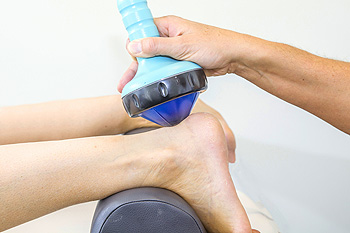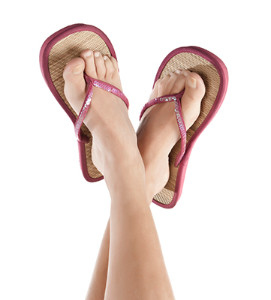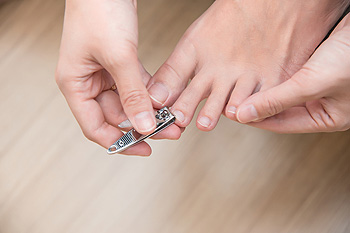September 2018
What Type of Virus Causes Plantar Warts?
 If you should develop a plantar wart, you may often be aware of the pain and discomfort that is associated with it. They are typically common warts, and form on the heel of the foot. The pain may be at it’s worse in the morning after rising, and may often feel like pieces of glass that have lodged in your heel. Research has shown that plantar warts originate from the human papillomavirus, and often lives and thrives in warm and moist places that may include locker and shower room floors, pools, and surrounding areas. It can typically enter the body thru small cracks in the sole of the foot and prevention of this virus may be accomplished by wearing appropriate shoes, while in these areas. There are several noticeable symptoms associated with this ailment, including a small and hardened round area appearing on the heel of the foot, possibly with black dots occupying the center. If you have developed a plantar wart, it’s suggested to seek counsel from a podiatrist as quickly as possible to begin the best course of treatment.
If you should develop a plantar wart, you may often be aware of the pain and discomfort that is associated with it. They are typically common warts, and form on the heel of the foot. The pain may be at it’s worse in the morning after rising, and may often feel like pieces of glass that have lodged in your heel. Research has shown that plantar warts originate from the human papillomavirus, and often lives and thrives in warm and moist places that may include locker and shower room floors, pools, and surrounding areas. It can typically enter the body thru small cracks in the sole of the foot and prevention of this virus may be accomplished by wearing appropriate shoes, while in these areas. There are several noticeable symptoms associated with this ailment, including a small and hardened round area appearing on the heel of the foot, possibly with black dots occupying the center. If you have developed a plantar wart, it’s suggested to seek counsel from a podiatrist as quickly as possible to begin the best course of treatment.
Plantar warts can be very uncomfortable. If you need your feet checked, contact Dr. Steven Schwartz from Pennsylvania. Our doctor will assist you with all of your foot and ankle needs.
About Plantar Warts
Plantar warts are the result of HPV, or human papillomavirus, getting into open wounds on the feet. They are mostly found on the heels or balls of the feet.
While plantar warts are generally harmless, those experiencing excessive pain or those suffering from diabetes or a compromised immune system require immediate medical care. Plantar warts are easily diagnosed, usually through scraping off a bit of rough skin or by getting a biopsy.
Symptoms
- Lesions on the bottom of your feet, usually rough and grainy
- Hard or thick callused spots
- Wart seeds, which are small clotted blood vessels that look like little black spots
- Pain, discomfort, or tenderness of your feet when walking or standing
Treatment
- Freezing
- Electric tool removal
- Laser Treatment
- Topical Creams (prescription only)
- Over-the-counter medications
To help prevent developing plantar warts, avoid walking barefoot over abrasive surfaces that can cause cuts or wounds for HPV to get into. Avoiding direct contact with other warts, as well as not picking or rubbing existing warts, can help prevent the further spread of plantar warts. However, if you think you have developed plantar warts, speak to your podiatrist. He or she can diagnose the warts on your feet and recommend the appropriate treatment options.
If you have any questions please feel free to contact our offices located in Chambersburg, and Mcconnellsburg, PA . We offer the newest diagnostic and treatment technologies for all your foot and ankle needs.
The Purpose of Shockwave Therapy
 There is a technique that is referred to as extracorporeal shock wave therapy, which is also known as ESWT, that may aid in treating certain foot conditions such as plantar fasciitis. There are two types of shock wave treatments that may be used, and these are referred to as low-energy and high-energy treatments. Low-energy treatments are typically administered over a period of time and may produce mild discomfort. The opposite may be true of the latter, and is often performed in a single treatment, which may often require general anesthesia. The purpose of these treatments is to promote healing of the tissues and surrounding areas affected by the foot condition. Recent research has shown little effectiveness of these treatments and many patients may still have pain after treatment. It’s important to speak with a podiatrist if you would like additional information about shockwave therapy.
There is a technique that is referred to as extracorporeal shock wave therapy, which is also known as ESWT, that may aid in treating certain foot conditions such as plantar fasciitis. There are two types of shock wave treatments that may be used, and these are referred to as low-energy and high-energy treatments. Low-energy treatments are typically administered over a period of time and may produce mild discomfort. The opposite may be true of the latter, and is often performed in a single treatment, which may often require general anesthesia. The purpose of these treatments is to promote healing of the tissues and surrounding areas affected by the foot condition. Recent research has shown little effectiveness of these treatments and many patients may still have pain after treatment. It’s important to speak with a podiatrist if you would like additional information about shockwave therapy.
Shockwave therapy is a treatment commonly used to treat various injuries and conditions, particularly plantar fasciitis in the feet. To learn more, consult with Dr. Steven Schwartz from Pennsylvania. Our doctor can provide the care you need to keep you pain-free and on your feet.
Shockwave Therapy
Shockwave therapy is a new treatment option designed to treat bone conditions such as tennis elbow, shoulder pain, and others. Shockwave therapy uses high intensity sound waves that are directed to the affected tissues of the body with pinpoint accuracy. The effects are very beneficial, leading to a production of collagen fibers, eliminating inflammation.
Who Benefits from Shockwave?
Shockwave is recommended for patients suffering from heel pain and associated problems. Heel pain is a common condition which can be caused by obesity, overexertion, and spending a substantial amount of time on hard floors with your feet exposed and unsupported.
Fast and Easy
The therapy is actually a simple process that can leave patients feeling better the very next day. Shockwave therapy is not as dramatic as it sounds. It enables more blood flow to effected areas, addressing the source of the problem and allowing treatment to last for a long time.
Treatment & Recovery Time
Shockwave treatment will enable your feet to recover quickly. This is especially important since surgery is not required. It is cost effective and does not require the use of anesthesia. This treatment is a better option to surgery, since it is proven safe.
If you have any questions, please feel free to contact our offices located in Chambersburg, and Mcconnellsburg, PA . We offer the newest diagnostic and treatment technologies for all your foot and ankle needs.
Foot Conditions That May Occur as a Result of Wearing Flip Flops
 The type of footwear referred to as flip flops are popular summer shoes that are made of thin soles and typically are not meant to be worn for extended periods of time. Despite the fact that many people indulge in wearing these types of shoes, there may be moderate discomfort and symptoms that can be associated with them. These may include an achy feeling that may be present in the foot and ankle in addition to the formation of calluses and blisters. Other foot conditions that may develop as a result of wearing flip flops may be the development of bunions and hammertoes. The risk of injury may be increased from choosing to wear this type of shoe and this may occur as a result of a lack of stability. If you have questions pertaining to flip flops and would like additional information about the pros and cons for wearing this type of shoe, please schedule an appointment with a podiatrist who will be able to answer any questions you may have.
The type of footwear referred to as flip flops are popular summer shoes that are made of thin soles and typically are not meant to be worn for extended periods of time. Despite the fact that many people indulge in wearing these types of shoes, there may be moderate discomfort and symptoms that can be associated with them. These may include an achy feeling that may be present in the foot and ankle in addition to the formation of calluses and blisters. Other foot conditions that may develop as a result of wearing flip flops may be the development of bunions and hammertoes. The risk of injury may be increased from choosing to wear this type of shoe and this may occur as a result of a lack of stability. If you have questions pertaining to flip flops and would like additional information about the pros and cons for wearing this type of shoe, please schedule an appointment with a podiatrist who will be able to answer any questions you may have.
Flip-flops are not always the best choice of footwear. If you have any concerns about your feet or ankles, contact Dr. Steven Schwartz from Pennsylvania. Our doctor will assist you with all of your foot and ankle needs.
Flip-Flops and Feet
When the weather starts warming up, people enjoy wearing flip-flops. Flip-flops are comfortable, stylish, and easy to slip on and off; they're perfect for any summer beach goer. However, these shoes can cause harm to the feet.
How Can Flip-Flops Affect Me Long-Term?
- Ankle problems
- Hip problems
- Lower back problems
- Pain in the balls of the feet
- Problems with foot arches
- Changes in the way you walk
Are There Injuries Associated with Flip-Flops?
Yes. Since flip-flops are relatively weak and do not provide the same amount of support as sneakers, people who wear flip-flops regularly are more susceptible to injuries. On top of that, the open nature of the shoe makes your feet more prone to other problems, such as cuts and even infections. Common injuries and ailments include:
- Sprained ankles
- Blisters
- Infections
- Cuts and Scrapes
I like Wearing Flip-Flops. Are There Safe Alternatives?
When buying flip-flops, try to find ones that have sturdy soles and that are made of high-quality materials that will support for your feet. These flip-flops will cost more but will also last longer as a result.
If you have any questions please feel free to contact our offices located in Chambersburg, and Mcconnellsburg, PA . We offer the newest diagnostic and treatment technologies for all your foot and ankle needs.
How to Practice Proper Foot Care
 You should always take care of your feet to make sure they stay at their best. If you are looking for ways to practice proper foot care, you should start with washing your feet every day in warm water. When you are finished washing your feet, you should carefully dry them and make sure the spaces between your toes are dry as well. Additionally, you should check your feet every day to see if there are any sores, blisters, or cuts on your feet. Trimming your toenails is another important step in foot care. When you cut your nails, be sure to cut them straight across instead of in a rounded shape. If you find it difficult to trim your nails or need guidance on how to properly care for your feet, an appointment with your podiatrist can help.
You should always take care of your feet to make sure they stay at their best. If you are looking for ways to practice proper foot care, you should start with washing your feet every day in warm water. When you are finished washing your feet, you should carefully dry them and make sure the spaces between your toes are dry as well. Additionally, you should check your feet every day to see if there are any sores, blisters, or cuts on your feet. Trimming your toenails is another important step in foot care. When you cut your nails, be sure to cut them straight across instead of in a rounded shape. If you find it difficult to trim your nails or need guidance on how to properly care for your feet, an appointment with your podiatrist can help.
Everyday foot care is very important to prevent infection and other foot ailments. If you need your feet checked, contact Dr. Steven Schwartz from Pennsylvania. Our doctor can provide the care you need to keep you pain-free and on your feet.
Everyday Foot Care
Often, people take care of their bodies, face and hair more so than they do for their feet. But the feet are a very important aspect of our bodies, and one that we should pay more attention to. Without our feet, we would not be able to perform most daily tasks.
It is best to check your feet regularly to make sure there are no new bruises or cuts that you may not have noticed before. For dry feet, moisturizer can easily be a remedy and can be applied as often as necessary to the affected areas. Wearing shoes that fit well can also help you maintain good foot health, as well as making it easier to walk and do daily activities without the stress or pain of ill-fitting shoes, high heels, or even flip flops. Wearing clean socks with closed shoes is important to ensure that sweat and bacteria do not accumulate within the shoe. Clean socks help to prevent Athlete’s foot, fungi problems, bad odors, and can absorb sweat.
If you have any questions please feel free to contact our offices located in Chambersburg, and Mcconnellsburg, PA . We offer the newest diagnostic and treatment technologies for all your foot and ankle needs.

